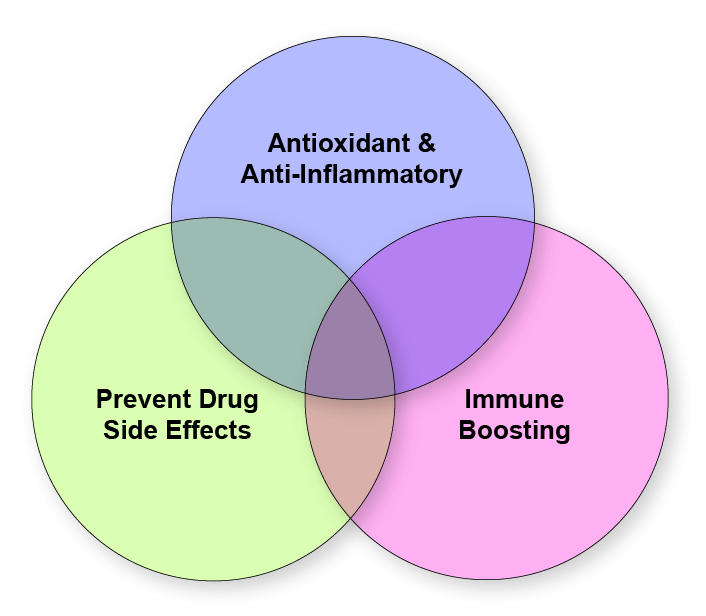Immune System Support for People with HIV or AIDS

As in other types of infections, diet and nutrition are important to the immune system. Nutritional deficiencies weaken the immune system, make symptoms worse, and promote the progression of HIV and AIDS. The virus itself causes free radical damage and further promotes the disease. (ii.85, 90)
In addition to antiviral medication and a good diet, alpha lipoic acid helps support the immune system. As an antioxidant, alpha lipoic acid can also prevent damage from free radicals. Experts suggest that both of these properties can help prevent the progression of HIV. Naturopaths recommend taking 100-600 mg/day of alpha lipoic acid supplements. (ii.85, 90)

Figure II.1: Overall Beneficial Effects of Alpha Lipoic Acid against HIV
How Can Alpha Lipoic Acid Help Patients with HIV?
Some of the specific cellular activity that studies show alpha lipoic acid has against HIV includes:
| Alpha Lipoic Acid Activity | Why Is This Important? |
|---|---|
|
Boosts functioning of mitochondria (the organelle that makes cell energy) inside cells of patients with HIV-1. (ii.13) |
Could help prevent some of the negative side effects of HIV drug treatments, such as: (ii.13, 79) |
|
Increases functioning of lymphocyte cells and glutathione antioxidant levels (even in patients who are nonresponsive to antiviral drugs). (ii.90) |
Boosts reduced immune system and antioxidant protection. (ii.90) |
|
Raises CD4 cell levels in some HIV-infected patients. (ii.14) |
Helps protect against opportunistic infections, a complication in patients with HIV. (ii.91) |
|
Inhibits NF-κB inflammatory transcription factor. (ii.92) |
Curbs activation and activity of HIV virus. (ii.92) |
|
Reduces levels of Tat, an enzyme expressed by HIV. (ii.92) |
Suppresses HIV replication. (ii.92) |
Researchers suggest alpha lipoic acid may also reduce the risk of developing kidney stones in HIV patients taking the antiviral drug indinavir. (ii.14)
Clinical Evidence of Alpha Lipoic Acid's Benefits in Patients with HIV
Results of a rigorous clinical trial suggest that taking micronutrients along with standard antiretroviral therapy could help boost the immune system of people infected with HIV. Conducted in 2006, 40 patients were given K-PAX Immune Support Formula twice a day. (ii.89)

K-PAX contains a broad mix of vitamins, minerals, amino acids, and other nutrients, along with 400 mg of alpha lipoic acid. Besides alpha lipoic acid, ingredients include: (ii.89)
- N-acetyl cysteine
- Acetyl L-carnitine
- Beta carotene
- B vitamins (biotin, folic acid, inositol, niacinamide, pantothenic acid, riboflavin, thiamine, vitamin B6, and vitamin B12)
- Boron, calcium, chromium, copper, iodine, iron, manganese, magnesium, molybdenum, selenium, and zinc
- Choline
- Flavonoids
- L-glutamine betaine HCL
- Vitamin A, vitamin C, vitamin D, and vitamin E
Is Alpha Lipoic Acid Dangerous for People with HIV?
One editorial review stated that thioctic acid (another term for lipoic acid) showed a "negative effect on cognition." It referenced a 10-week, small clinical study conducted by the Dana Consortium on treating HIV-related dementia and cognitive disorders. (ii.93)
However, reading the actual study showed "statistically insignificant" reductions in neuropsychological test scores in the 9 patients who took alpha lipoic acid. A Cochrane review of this trial confirmed that those taking thioctic acid performed worse on auditory verbal learning, but mentioned they did better on mean reaction times than those who didn't take it. (ii.94-95)
The other substance tested in the Dana study was deprenyl (metabolites of which are L-methamphetamine and L-amphetamine) which showed significant improvement in the neuropsychological test scores. The researchers noted that there both substances were "well-tolerated" by the patients in this study. (ii.94)


